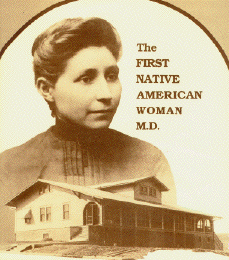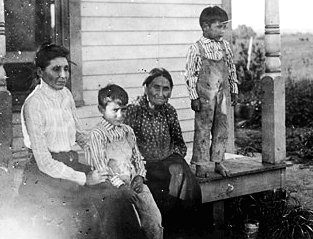 Susan La Flesche Picotte
Susan La Flesche Picotte
In the 19th century, few U.S. medical schools would accept women, and at first, none wanted a Native-American woman. This is an unusual story.
(Story continues from "Read More")
Born in 1865 on the Omaha Indian reservation in Nebraska, Susan's parents were half white, half Omaha, and her father, Joseph La Flesche, was the Tribal Chief.
Susan's father encouraged his children to speak English as well as Omaha, and learn the ways of white people, because he believed it would open many opportunities for them.
As a result, Susan was educated in a Quaker boarding school on the reservation.
She later graduated from Hampton Institute in Virginia, a "Negro" college that Native-Americans were allowed to attend to "civilize" them.
While at Hampton, Susan fell deeply in love with Thomas Ikinicapi, a handsome young man from the Sioux tribe.
But at that time, if a woman could get into medical school, she was expected to remain single for years afterward, to devote herself to her medical practice.
It was medical school or Thomas and with an aching heart, she chose medical school.
Susan was accepted by the Woman's Medical College of Pennsylvania, but she couldn't afford to attend.
 Susan La Flesche with her mother and sons
Susan La Flesche with her mother and sons
But the white women that comprised the Connecticut Indian Association supported her, paying her medical school expenses, including tuition, books and housing.
In 1889, Susan graduated as class valedictorian, and subsequently became the Omaha Agency Indian School Doctor.
Susan's practice also included the local community, among them white people willing to trust "an Indian" to care for them.
She often made house calls, and for Native-Americans, also translated government documents and wrote letters for them to the Office of Indian Affairs, which ran the reservation.
In 1894, Susan married Henry Picotte (pronounced "Pee Cot") from the Sioux tribe, and later they had two sons.
But Henry was an alcoholic, unable to support their family.
Alcohol devastated the Omaha tribe, and the community at large, and Susan campaigned against alcohol as a temperance movement leader.
She also tried to stamp out tuberculosis, which took many lives including Henry's in 1905.
But through it all Susan had a seemingly impossible dream, to build a hospital on the reservation, and in 1913, her dream came true, a godsend to the Omaha tribe.
 Susan La Flesche Picotte Memorial Hospital
Susan La Flesche Picotte Memorial Hospital
Today, that beautiful hospital, now a community medical center and a National Historic Landmark is named in her honor, a fitting tribute to the woman whose work made that hospital possible.